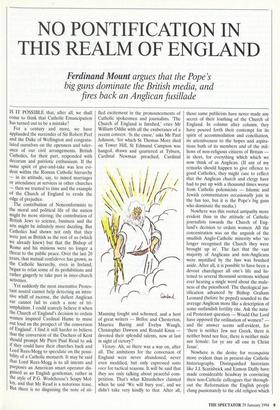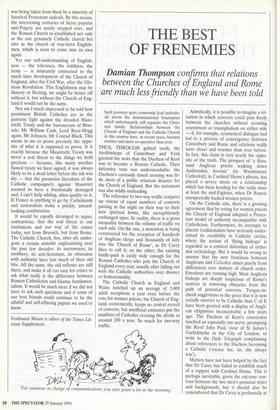NO PONTIFICATION IN THIS REALM OF ENGLAND
Ferdinand Mount argues that the Pope's
big guns dominate the British media, and fires back an Anglican fusillade
IS IT POSSIBLE that, after all, we shall come to think that Catholic Emancipation has turned out to be a mistake?
For a century and more, we have applauded the surrender of Sir Robert Peel and the Duke of Wellington and congratu- lated ourselves on the openness and toler- ance of our civil arrangements. British Catholics, for their part, responded with decorum and patriotic enthusiasm. If the same spirit of give-and-take was less evi- dent within the Roman Catholic hierarchy — in its attitude, say, to mixed marriages or attendance at services in other churches — then we trusted to time and the example of the Church of England to erode the edge of prejudice.
The contribution of Nonconformists to the moral and political life of the nation might be more stirring; the contribution of British Jews to science, business and the arts might be infinitely more dazzling. But Catholics had shown not only that they were just as British as the rest of us (which we already knew) but that the Bishop of Rome and his minions were no longer a threat to the public peace. Over the last 20 years, that mutual confidence has grown, as the Catholic hierarchy, even in Ireland, began to relax some of its prohibitions and rather gingerly to take part in inter-church activities.
Yet suddenly the most insensitive Protes- tant nostril cannot help detecting an intru- sive whiff of incense, the dullest Anglican ear cannot fail to catch a note of tri- umphalism. I could scarcely believe it when the Church of England's decision to ordain women inspired Cardinal Hume to muse out loud on the prospect of 'the conversion of England'. I find it still harder to believe that the conversion of the Duchess of Kent should prompt Mr Piers Paul Read to ask if they could have their churches back and Lord Rees-Mogg to speculate on the possi- bility of a Catholic monarch. It may be said that Lord Rees-Mogg is to all intents and Purposes an American smart operator dis- guised as an English gentleman, rather in the style of P.G. Wodehouse's Soapy Mol- loy, and that Mr Read is a notorious tease. But there is no disguising the note of sti- fled excitement in the pronouncements of Catholic spokesmen and journalists. 'The Church of England is finished,' cries Mr William Oddie with all the exuberance of a recent convert. 'Is the cause,' asks Mr Paul Johnson, 'for which St Thomas More died on Tower Hill, St Edmund Campion was hanged, drawn and quartered at Tyburn, Cardinal Newman preached, Cardinal Manning fought and schemed, and a host of great writers — Belloc and Chesterton, Maurice Baring and Evelyn Waugh, Christopher Dawson and Ronald Knox devoted their splendid talents, now at last in sight of victory?'
Victory. Ah, so there was a war on, after all. The ambitions for the conversion of England were never abandoned, never even modified, but only expressed sotto voce for tactical reasons. It will be said that they are only talking about peaceful com- petition. That's what Khrushchev claimed when he said 'We will bury you', and we didn't take very kindly to that. After all,
those same publicists have never made any secret of their loathing of the Church of England. In column after column, they have poured forth their contempt for its spirit of accommodation and conciliation, its attentiveness to the hopes and aspira- tions both of its members and of the mil- lions of non-religious citizens of Britain in short, for everything which which we now think of as Anglican. (If any of my remarks should happen to give offence to good Catholics, they might care to reflect that the Anglican church and clergy have had to put up with a thousand times worse from Catholic polemicists — Islamic and Jewish commentators occasionally join in the fun too, but it is the Pope's big guns who dominate the media.) Nowhere was this rooted antipathy more evident than in the attitude of Catholic journalists towards the Church of Eng- land's decision to ordain women. All the concentration was on the anguish of the smallish Anglo-Catholic minority who 'no longer recognised the Church they were brought up in'. The fact that the vast majority of Anglicans and non-Anglicans were mystified by the fuss was brushed aside. After all, it is possible to have been a devout churchgoer all one's life and lis- tened to several thousand sermons without ever hearing a single word about the male- ness of the priesthood. The theological jus- tification advanced by Bishop Graham Leonard (before he poped) sounded to the average Anglican more like a description of some outlandish fertility rite. Ask the natu- ral Protestant question — Would Our Lord have opposed the ordination of women? and the answer seems self-evident, for 'there is neither Jew nor Greek, there is neither bond nor free, there is neither male nor female: for ye are all one in Christ Jesus'.
Nowhere is the desire for reconquista more evident than in present-day Catholic historiography. Distinguished historians
like J.J. Scarisbrick and Eamon Duffy have made considerable headway in convincing their non-Catholic colleagues that through- out the Reformation the English people clung passionately to the old religion which was being taken from them by a minority of fanatical Protestant radicals. By this means, the intervening centuries of fierce popular anti-Popery are neatly stepped over, and the Roman Church re-established not only as the one genuinely Catholic church but also as the church of true-born English- men, which is soon to come into its own again.
Yet our self-understanding of English- ness — the tolerance, the mildness, the irony — is intimately connected to the much later developirient of the Church of England, after the Civil War, after the Glo- rious Revolution, This Englishness may be illusory or fleeting, we might be better off without it, but without the Church of Eng- land it would not be the same.
Nor am I much impressed to be told how prominent British Catholics are in the patriotic fight against the dreaded Maas- tricht Treaty and the bureaucrats of Brus- sels: Mr William Cash, Lord Rees-Mogg again, Mr Johnson, Mr Conrad Black. This seems to me to prove precisely the oppo- site of what it is supposed to prove. It is exactly because the Maastricht Treaty was
never a real threat to the things we hold precious — because, like many another
flawed treaty we have signed, it was always
likely to be a dead letter before the ink was dry — that the paranoiac literalism of the
Catholic campaigners against Maastrict seemed to have a fractionally deranged and, I can't help adding, alien quality to it.
If France is anything to go by, Catholicism and nationalism make a prickly, inward- looking combination.
It would be equally deranged to argue, contrariwise, that the real threat to our institutions and our way of life comes today, not from Brussels, but from Rome. The Catholic Church, has, after all, under- gone a certain amiable anglicanising over the past few decades: its narrowness, its snobbery, its anti-Semitism, its obsession with authority have lost much of their old bite. All the same, the old reflexes are still there, and make it all too easy for critics to ask what really is the difference between Roman Catholicism and Islamic fundamen- talism. It would be much nicer if we did not have to ask such questions and if some of our best friends could continue to be the affable and self-effacing papists we used to know.
Ferdinand Mount is editor of the Times Lit- erary Supplement.



































































 Previous page
Previous page